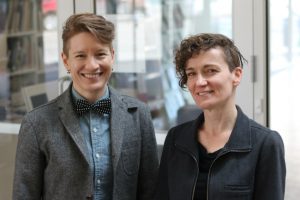
WINNIPEG, MB – UWinnipeg’s Dr. Heather Milne (English), with co-applicant Dr. Angela Failler (Women’s and Gender Studies), has been awarded over $22,000 to support the workshop Museum Queeries: Intersectional Interventions into Museum Cultures and Practices. This funding comes from a Social Sciences and Humanities Research Council (SSHRC) Connection Grant and the Manitoba Research Connections Program.
The invite only workshop will be hosted at UWinnipeg this June to coincide with Winnipeg’s Pride Week and includes a site visit to the Canadian Museum for Human Rights (CMHR). The workshop will be facilitated by Dr. Shelley Ruth Butler (McGill) and include a Curatorial Dreaming exercise.
“The overall goal of the workshop is to connect members of our newly formed Museum Queeries research network, and translate specific objectives into tangible strategies for engaging museums on 2S+LGBTTQ issues,” Milne said. “We use an intersectional approach to think through ways in which gender, sexuality, race, class, ability, religion, ethnicity, and national identities are inter-implicated in museums and in museumgoers’ points of contact with museums. This workshop will be the first time our research team, which hails from across Canada, the U.S., and Australia, will come together to begin these important discussions.”
The CMHR is a catalyst for Museum Queeries and an ideal research site given the University’s proximity to the museum here in Winnipeg. UWinnipeg has already established a relationship with the museum through the work of its Cultural Studies Research Group and Failler’s SSHRC Partnership Development Grant project. The intent is to engage and potentially collaborate with the CMHR and other museums, galleries, and exhibition sites by proposing ways in which they might more effectively address 2S+LGBTTQ issues.
About the Project
Museum Queeries is a new interdisciplinary, collaborative research project based at UWinnipeg that involves academics, activists, curators, artists, community stakeholders, and students locally and internationally. As institutional spaces, museums are often closely linked to national identities and histories and also, tacitly, to heteronormative and cisnormative representations of the polity and public culture. Museum Queeries prioritizes Indigenous Two-spirit, lesbian, gay, bisexual, transgender, transsexual, and queer (2S+LGBTTQ) contributions and interventions into museums and museum studies as a means of addressing structural exclusions and opening new modes of productive inquiry and activism. The idea of “queerying” the museum in this case is not only about addressing the museum’s representation of gender and sexuality; it is also about challenging normative formations including white privilege, racism and settler colonialism, among other systems of oppression, as they operate alongside homophobia and transphobia.
